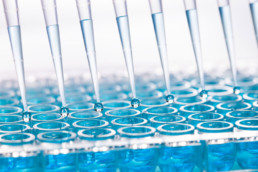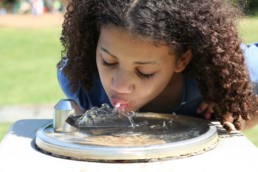Water Testing—What’s In Your Water?
Our Water Testing Recommendation
Take the guesswork out of your water quality by using the water testing experts. The most common water tests are city water or well water samples. Many water treatment and plumbing companies offer free water testing to diagnose what is in your water and recommend a water purification solution for your home or business. You can find online home testing kits to scan your water; however, since most companies offer free water testing, we recommend you seek out a professional to complete this test for you.
Here are the common lab tests conducted:
Temperature Testing
pH Testing
Chloride Test
Salinity Testing

Turbidity Test

Dissolved Oxygen Test
Pesticides

Nitrate and Phosphate

Redox
Electrical Conductivity

Metals
What Do Water Testing Results Expose?
Regular water testing can be helpful over a long period-of-time to monitor any changes that occur in water quality. Water safety standards in the USA are called MCLs or Maximum Contaminant Levels. MCL’s are set by federal and state governments for all public water systems (utilities) in the USA and are based on the health risks of each contaminant but also on the possible costs of treating water for your entire community. For many reasons, some contaminants can be dangerous but only too expensive to manage at scale, so federal MCLs are often higher than levels known to have an impact on your health. Also, it’s a good idea to conduct water testing in response to an unexpected event such as a chemical spill and fracking.

Chemicals migrate into the water from old pipes, industry, agriculture, and other sources that will change the compounds of your water source. Many contaminates do not have taste, color, or smell.
Isn’t My City Water Clean And Regulated?
Most of the water quality data that you can get online, including this MyTapWater.org, will be based on the water that is tested after the treatment of your PWSID (Primary Water Source Type). After the PWSID, though, water is distributed in large mains, which make their way to smaller pipes and ultimately to your home and its faucets. Along the way, especially in the piping of older homes, the water can pick up contaminants that were not present when the water left the treatment facility. At this point, there is no more testing completed. Both screening and filtering at endpoints happen at the discretion of the owner, so the EPA and other organizations are primarily outside of the process by this point. It’s worth noting now that the same applies to well water. Private drinking wells are mostly tiny little water facilities that the EPA does not regulate.
Types of Water Testing
There is a wide variety of different water testing on the market to test three major areas; city, well, and specialized tests. The city water tests help you protect your home with laboratory water testing, precise health risks analysis, and unbiased treatment recommendations. City water testing looks for Physical Parameters, Toxic Metals, Nitrate, Chlorine, Chloramine, Plastic Pipe Chemicals, Trihalomethanes, Haloacetic Acids, Radioactive Particles, Chlorate, and some more.
Well water testing generally tests for the following; General Chemistry, Hardness & Alkalinity, Toxic & Heavy Metals, Nitrate & Nitrite, Coliform & E.coli, Industrial Chemicals, Disinfection Byproducts, Oil & Gas Indicators, Silica, Radioactive Particles, PFAS / PFOA, and some more. There are additional specialized testing that can be ordered with laboratories that include the measurement of; Alpha and Beta radiation, pesticides, specific strains of bacteria, mold, petroleum, fluoride, and many others.
Why Does The Quality Of Water Matter?
Did you know that each person on Earth requires at least 20 to 50 liters of clean, safe water a day for drinking, cooking, and simply keeping themselves clean? Not only is it essential for our bodies, but it’s also crucial for the environment that surrounds us like animals, plants, the air, and much more. If the soil, air, and food we use to survive are toxic by inadequate water, we risk the plants well being and our health. Polluted water isn’t just dirty—it’s deadly. Some 1.8 million people die every year of diarrheal diseases like cholera.
Water is a fundamental human need. According to research, water is the second most popular drink in America after soft drinks.

Benefits Of Safe Water For Your Body
One of the advantages you get from taking clean water is the fact that it helps in maintaining a balance in your body fluids. Body fluids are vital in the digestion of food, absorption, and transport of nutrients, body temperature maintenance, the creation of saliva, and many other benefits. Did you know that water can help you lose and maintain weight loss? Yes, this is right. When you drink water before and after a meal, you are less likely to overeat. Another reason why it’s essential to drink clean water in large amounts is freshwater is very beneficial to kidney health. Body fluids tend to deposit a lot of toxins in cells during the transportation of nutrients. One of the most dangerous toxins in the body is nitrogen found in the blood. To prevent this, make sure you have enough water each day. These are just a few examples of the many benefits that clean, purified, safe water benefits our bodies.

Balance in your body fluids

Maintain Weight Loss
Kidney Health
The Importance Of Water Softeners
If you have hard water, you may notice stains on the sink or bathtub. The stains found on your sink don’t stop there, though—they build up along the inside of your pipes and clog your drains. You can imagine what those minerals are doing to your body as you consume them. The build-up on your pipes is caused by hard water. Your plumber will be making regular trips to unclog your drains; in turn, you will spend more money on buying soaps to get things clean. Don’t worry; a good water softener will last many years. Softeners that were supplied in the 1980s may still work, and many need little maintenance, besides filling them with salt occasionally.
The Benefits of Whole House Water Softener
Have you noticed your water stains items and smells funny? If yes, you probably have hard water in your home, and adding a water softener will help with many household hard water annoyances. Water treated with a water softener versus untreated hard water has many benefits by looking at each room of the house:

Kitchen
No more spots! Your glasses will be clear instead of cloudy, you won’t need as much soap to get the job done, and your hands will feel softer.

Bathroom
Showering will be a much more pleasant experience as you will get and feel cleaner. Your hair and skin will feel healthier and softer and no more soap scum and stains on sinks, tubs, and toilets.

Laundry Room
Your clothes will be softer, cleaner, and brighter in color, you won’t need as much detergent, and your clothes will last longer when you have a water softener installed.

Throughout the House
Reduced soap makes cleaning easier and reduces housework by preserving the life of all water appliances such as coffee machines, ice makers, dishwashers, water heaters, & laundry equipment.